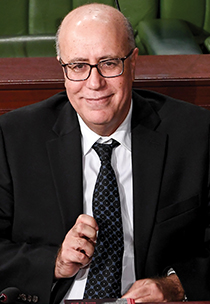Tunisia's central bank governor looks to a new age of stability
The governor of the Central Bank of Tunisia, Marouane El Abassi, talks to Courtney Fingar about containing inflation and the potential impact of the country’s upcoming elections.
Q: The Tunisian banking sector has suffered in recent times from under-capitalisation and a lack of liquidity. What is the status now?
A: That was the case three or four years ago, mainly with our state-owned banks, but with the World Bank’s technical assistance we have increased the capital of these three banks. It is not exactly to the level of the private banks but they are moving in the right direction. There is some pressure on liquidity, but what we’re trying to do is maintain pressure on the banks to be competitive. Sometimes it is working and sometimes it is not.
We also introduced basic rules regarding the governance of the three banks. The figures for 2018 are better than they were for 2016 and 2017 and I think we’re moving in the right direction. Among the private banks, they’re also getting a lot of technical assistance from their headquarters and it’s helping; we can see the difference and they are functioning very well.
We have some issues with the former development banks, and what I’m trying to do this year is increase the pressure on these banks so they will either merge or die. I’m pushing the government [to withdraw] public participation in these banks; I want to make sure the government is out and then these banks can move on and become competitive.
Q: You took some criticism for raising interest rates. How well is this measure working to contain inflation?
A: We’ve done a lot of work on inflation. When I took up my position last year, the inflation rate was close to 7% and the interest rate was close to 5%, and there was 200 basis points difference. Then in March 2018 I had to increase the interest rate about 75 basis points, once more in June and again in February 2019. It was increased from 200 to 275 points in one year. Now we can see that core inflation is decreasing: it was 6.9% April, and 7% in May, and we are thinking that for the whole year it should be close to 7% and decreasing to 6.7% in 2020. That is what we are predicting, but as you know there are a lot of internal and external shocks [that could affect the situation].
Q: What is the central bank’s outlook for the Tunisian economy in the short to medium term?
A: We have predicted 2.7% growth by the end of 2019, and hopefully we can achieve this. [The second quarter of 2019] was not very good, but we think we will have strong tourism figures, which have recovered from the 2015 terrorist attacks, and we should also have a very good agricultural harvest. What is really important to highlight is the quality of the growth. Before, it was mainly based on the demand side, but it is changing because it is now related to the industrial sector, to services, and so on. The investment is not yet back, but hopefully once we regain political stability we can get out of political transition, and we can get some significant international investment coming back. We are hopefully at the end of a political transition and we are trying to [achieve] stronger economic growth.
Q: Parliamentary elections will take place in October, with the presidential vote to follow in November. Will the outcomes affect your forecasts either way?
A: I don’t think so. Tunisia is a diversified economy, and that helps; but importantly there is a new maturity with regards to the understanding that our political parties and the general public have [of economic realities]. After the revolution, everyone thought the government could pay for everything, but now they are discovering that there are limits and accepting that they need to come back to work. [International observers] think we are undertaking reforms under pressure from the International Monetary Fund, but that is not the case. We know very well that we need to invest, work on the business environment, reduce public payroll bills, and restructure state-owned enterprises. [Whichever party wins] will carry out the reforms that are needed and I think within the political parties and across society, there’s a very deep understanding that the reforms should be done.



